Business
FG Inaugurates Council To Attract $575bn Gas Investments
The Federal Government has inaugurated a Seven-member Governing Council of the Midstream and Downstream Gas Infrastructure Fund (MDGIF), with the target of attracting $575billion investments in the Nigerian gas sector.
The MDGIF is a government fund set up to invest in infrastructure projects that will improve transportation and processing (midstream) and utilisation (downstream) of natural gas in Nigeria.
The Nigerian Midstream and Downstream Petroleum Regulatory Authority (NMDPRA) manages the MDGIF, while the governing council is chaired by the Minister of State for Petroleum Resources (Gas), Ekperikpe Ekpo, who oversees the fund’s activities.
The aim of the MDGIF include attracting more than $575bn in investments to develop Nigeria’s gas sector; expanding the midstream and downstream gas infrastructure to create a more robust gas market in Nigeria, among others.
Speaking at the inauguration meeting of the council in Abuja, at the weekend, the gas minister told the seven-member council that “the President’s confidence in my ability to chair the MDGIF is not just a personal honour but a clarion call to service for all of us”.
He added, “It reflects the belief that, together, we can harness the vast potential of our nation’s gas resources to drive innovation, create jobs and contribute significantly to the overall development of our beloved country”.
Ekpo noted that the establishment of the MDGIF came at a critical juncture in Nigeria’s energy landscape, as the country strives for economic diversification and sustainable development.
He said the MDGIF represents not just a financial instrument, but a symbol of the government’s dedication to fostering an environment conducive to private sector participation and international collaboration.
“Our goals are ambitious, but so is our determination. With the collective expertise and commitment of the governing council, as well as the support of our stakeholders, we aim to drive innovation, create employment opportunities, and ensure energy security for our nation.
“The MDGIF is not merely a fund; it is a vehicle for progress, a conduit for prosperity, and a catalyst for sustainable development. This alignment should, in turn, lead to a tangible reduction in the prices of LPG and CNG, benefitting particularly the low-income earners in our society”, Ekpo stated.
The Minister called on domestic and international stakeholders to collaborate in line with the recently signed executive orders on petroleum sector reform, aiming to boost investment in the oil and gas sector.
“Let us work together to unlock the vast potential of Nigeria’s gas sector and propel our nation to new heights of economic prosperity”, he asserted.
The Chief Executive of NMDPRA, Ahmed Farouk, who is also a member of the council, assured the Minister of the support of the NMDPRA and promised that the team would work hard to meet the goals of the council.
The MDGIF is to get its money from a small levy on the wholesale price of petroleum products and natural gas sold in Nigeria.
It is to also raise funds from grants and donations from international organisations and other institutions, as well as interest earned on the fund’s balance and income from any equity investments it makes.
###
Business
NIMASA Commits To Creating Enabling Environment For Maritime Business

Business
FG Inaugurates Special Committee Against Boat Accident

Business
LASG Arrests Illegal Dredgers … Issues Stop Work Order
-

 News5 days ago
News5 days agoHealth Commissioner Tasks New Employees on Professionalism
-
Business5 days ago
LASG Arrests Illegal Dredgers … Issues Stop Work Order
-
Politics5 days ago
Lagos Assembly Crisis: Rhodes-Vivour Calls For End To “Troubling Pattern”
-
Niger Delta5 days ago
Police Detain 5 Over Killing In Edo
-
News5 days ago
Akpoti-Uduaghan’s Harassment Claim Sign Of Weakness – Ita Giwa
-
Business5 days ago
Health Commissioner Tasks New Employees On Professionalism
-
Sports5 days ago
‘I Must Win Trophy Before Retirement’
-

 News5 days ago
News5 days agoReps Order MultiChoice To Suspend Subscription Hike

